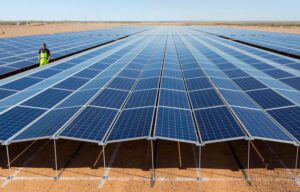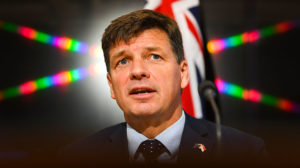Fresh doubt has been cast over multi-billion dollar plans to develop what would be one of the world’s biggest coalmines, in Queensland’s Galilee Basin, amid new claims the project is “uneconomical” and the major developer may not have the balance sheet to fund the project.
Against the backdrop of an already shaky global coal market, a report commissioned by Greenpeace and released on Monday night has found that the Indian coal conglomerate driving the project, Adani, is carrying $12 billion of debt and needs billions more to develop the project.
Last year, Adani announced plans to proceed with its $10 billion development of the massive and as-yet untapped Carmichael coal deposit, including large-scale rail and port infrastructure investment, that would create 9,000 jobs, and export coal to India from 2016.
 Last month, a $1.25 billion debt issuance was proposed to help refinance Adani Abbot Point Coal Terminal in Queensland, the 99-year lease for which was bought for $1.8 billion in May 2011.
Last month, a $1.25 billion debt issuance was proposed to help refinance Adani Abbot Point Coal Terminal in Queensland, the 99-year lease for which was bought for $1.8 billion in May 2011.
But the report, Remote Prospects, describes the Adani Group as a “weak partner for this expensive coal, rail and mine project,” because of its declining share price and rising debt.
“Debt is not necessarily a bad thing, as long as you’re making money,” said Tim Buckley, an independent financial analyst and one of the authors of the report. “Debt when you’re not making money, is a problem.”
“We estimate the external debt of the Adani Group at $US12 billion. So it is a very financially leveraged group of companies. And that’s before funding the majority of the $10 billion to be invested in Australia,” Buckley told ABC TV’s Lateline program on Monday night.
Last month, Moody’s rated Adani’s debt it at (P)Baa3 stable, and Moody’s vice-president and senior analyst as Matthew Moore warned that the rating “could face negative pressure if the company is unable to ramp up throughput at the terminal to the full 50mtpa run rate or if our base case expectation regarding contract renewals does not materialize”.
On top of this, the Greenpeace-commissioned report warns that the Galilee project is uneconomic – “a high cost coal product in a low priced coal market with an uncertain future.”
These claims come as GVK Hancock released a joint ASX statement with rail company Aurizon, announcing a new non-binding deal to provide equity and debt funding for the joint development of a rail line and a new coal terminal at the existing Abbot Point Port, “to unlock the Galilee Basin’s coal resources.” However, the scale of the project infrastructure has been significantly downgraded, partly because of the high costs and risks, and may not go ahead at all.
As we have noted on RenewEconomy before, the Queensland coal plans of Adani Group and the above companies are “built on the apparently unshakeable belief that coal can provide the only solution to the rampant energy needs of India – one the one of the world’s two fastest growing energy markets.”
But as the report notes, “India’s power market is fatally flawed …(and) cannot absorb the high price of coal from the Carmichael project.”
The report puts the domestic price of coal in India in the $US30/tonne range, while the price Carmichael coal requires would be over $US95/tonne (inclusive of shipping).
“Successful sales to India of Carmichael coal will place a substantial pressure on power generator profits and the price of electricity in India,” it says. “We see this as a flawed strategy, given conflicting currency, fiscal and balance of trade dynamics in India.”
Queensland Resources Council chief, Michael Roche – who at a Monday press conference described a “perfect storm of a collapse in coal prices, a stubbornly high Australian dollar and very high costs – has questioned Greenpeace’s motivations, as well as its position “to make a call on whether it’s a good time or not a good time to be investing in a new coal mine.”
But as Greenpeace’s Julien Vincent and Erland Howard noted in RenewEconomy last month, they are not the only ones.
“Investment banks and analysts such as Macquarie, who have been close to companies pursuing coal projects in the Galilee Basin have described the chances of the Galilee being opened up to coal mining as ‘increasingly remote’.”
Matthew Trivet, a coal market analyst at stockbrokers Patersons, agrees. “In the thermal market, it’s going to be quite difficult to see a lot of these greenfield or peripheral basins coming on line,” he told ABC’s Lateline. “You are going to need significantly higher prices to justify the huge amount of [capital expenditure] and the long lead times.”








